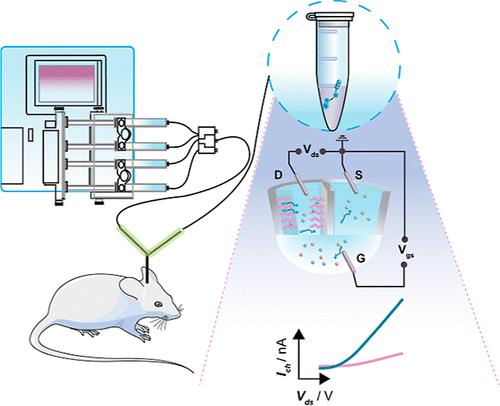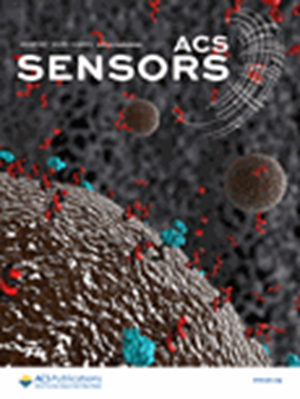Electrolyte-Gated Ionic Transistor for Highly Sensitive and Selective Iontronic Sensing
IF 8.2
1区 化学
Q1 CHEMISTRY, ANALYTICAL
引用次数: 0
Abstract
Iontronic sensors based on confined space have garnered significant attention due to their promising applications, ranging from single-cell analysis to in vivo studies. However, their limited sensitivity has constrained their effectiveness in studying molecular information during physiological and pathological processes. Here, we demonstrate an electrolyte-gated ionic transistor (EGIT) by integrating the confined ion transport behavior in a double-barreled micropipet with an electrolyte-gated transistor configuration, achieving highly sensitive and selective sensing. Our EGIT operates at a gate voltage of less than 1 V and can amplify ion current variations by up to 2 orders of magnitude. Both experimental methods and finite element simulations reveal that signal amplification stems from the intensified electric field. Thanks to the easily modified inner surface of the micropipet and the transistor configuration, we develop a highly sensitive and selective iontronic sensing platform for neurochemicals such as ATP, dopamine, and serotonin. More importantly, by utilizing this iontronic sensor, we successfully achieve the detection of trace ATP in rat striatum microdialysate. This study not only expands the scope of transistor technologies but also introduces a novel approach for constructing highly sensitive iontronic sensors, which hold potential applications in biochemical sensing, health monitoring, and disease diagnosis.

求助全文
约1分钟内获得全文
求助全文
来源期刊

ACS Sensors
Chemical Engineering-Bioengineering
CiteScore
14.50
自引率
3.40%
发文量
372
期刊介绍:
ACS Sensors is a peer-reviewed research journal that focuses on the dissemination of new and original knowledge in the field of sensor science, particularly those that selectively sense chemical or biological species or processes. The journal covers a broad range of topics, including but not limited to biosensors, chemical sensors, gas sensors, intracellular sensors, single molecule sensors, cell chips, and microfluidic devices. It aims to publish articles that address conceptual advances in sensing technology applicable to various types of analytes or application papers that report on the use of existing sensing concepts in new ways or for new analytes.
 求助内容:
求助内容: 应助结果提醒方式:
应助结果提醒方式:


